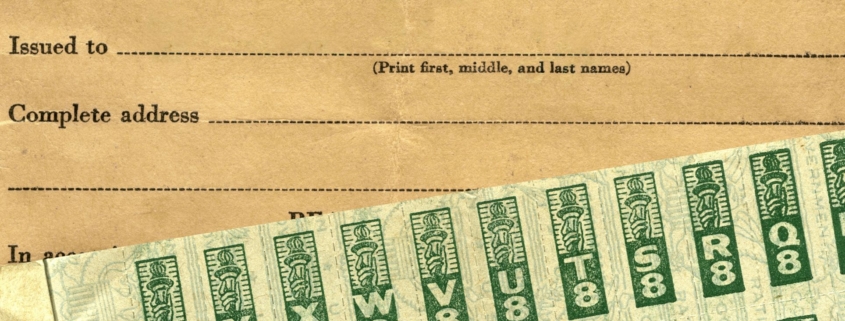The Ration Club
I discovered an intriguing bit of history in the archives of my previous church, which may provide an idea for a Christian response to the energy crisis. It was called, ‘The Ration Club.’
National Shortages
On 8th January 1940, the government brought in rationing to manage food shortages in Britain. The Germans were bombing food shipments from abroad and the country was not self-sufficient during World War II. So a whole range of food was put “on ration.” Sugar, eggs, butter, milk and bacon were restricted, for example.
Overnight an adult was only entitled to buy 1 egg a week, 2 oz of cheese, and similarly small amounts of other basics. Certain foods such as Macaroni became gold dust. Substitutes were found for rare commodities, such as replacing onions with garlic.
Even with a government issued ration book, there was no guarantee of finding the food you wanted. In February 1941, Vere Hodgson wrote in her diary that she longed for some fruit and went to buy a pound of apples, only to find nothing but Turnips in her local shops!
Such food shortages were hard for families, already struggling from the trauma of war. Hunger and queuing became a regular and unwelcome reality of life.
How did the church respond?
A Church Response
Well, one church set up a ration club. I discovered this from some meeting minutes at Holy Trinity Wallington. Whether this was part of a national initiative or just a local invention was not clear. But the Ration Club was run once week by the church in their hall for the community in South London.
The group did various things to help struggling families. They shared recipes and ideas of how to make rations go further, they pooled ration tokens, provided practical help to others facing hardship, and they shared their hope in Christ. It was a practical and caring response to a national crisis – and not without personal cost.
I was told that the Luftwaffe used to regularly dump their unused bombs on Wallington when returning home from London raids, to lighten their load before crossing the channel. Hence, many of the buildings had their windows blown out, making life unpleasantly cold in winter. Food sacrifice, bombs, and the cold were therefore the hazards of running the club.
Energy Crisis
This week, the energy crisis will bite. New charges for gas and electricity will come into effect on 1st October. Although protected somewhat by the price cap, many will be pushed into fuel poverty and will face a cold and miserable winter.
We are called to “faith, love and hope” as Christians (1 Cor 13:13). But what does Christian love look like in a national energy crisis? What might be our equivalent of the Ration Club?
Local councils have been identifying ‘warm banks’ or places for people to meet in winter. Could churches offer a warm space to people during the cold months? Maybe we could share our energy saving tips, LED bulbs, or even spare home insulation. As individuals, could we invite elderly and vulnerable neighbours round for a couple of hours every week or take them out to a warm cafe? A place where people can discover the heart-warming message of Christ is a great need.
Radical Generosity
The World Energy Council has called for a spirit of “radical generosity” in communities to prevent the cost-of-living crisis becoming “a cost of lives crisis” this winter. And they are right: such actions will require generosity because providing warm spaces will cost considerable money.
Our church faces a 100% rise in fuel bills in the new year, despite the energy cap. Our monthly bills will cost hundreds of pounds more in the colder months. Charities like ours don’t get help with these costs; these bills are covered solely by the generosity of our members’ donations. It will mean a personal sacrifice for us to open our churches and homes, at a time when we are all under financial pressure.
And, yet, this is a chance to turn on the radical generosity of Christ, while others turn off their heating. The greatest love is shown by sacrificing ourselves for others, according to the Bible (John 15:13). Wouldn’t it be great if future Christians were inspired by our church records to that same Christ-like love?
It is something to pray for.



